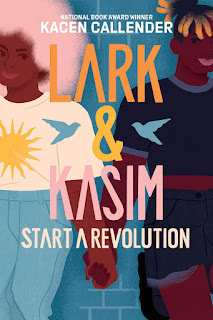I had real problems with this book. I really wanted to like it, but there were so many things about it that annoyed me that I struggled to get through it.
This is a book where the entire central conflict could have been solved really, really easily, with a single conversation and I found it difficult to believe that no one else could see this.
Lark and Kasim used to be besties, but over the last year or so, they haven't been talking. One night Kasim is at Lark's house at the invitation of their mother and accidently posts on Lark's Twitter account, saying he's in love with someone who doesn't love him back. Lark, who wants to be a writer has been cultivating their Twitter followers in the hope it will be a good platform when they're published so takes this violation really seriously. But rather than tell the truth, Lark goes along with the story, using it to get closer to someone they're attracted to. That this new relationship send their follower numbers into the stratosphere doesn't hurt either.
But the relationship isn't that great and Lark quickly realises that and has to admit that they'd rather be with Kasim. How can they extricate themselves from a relationship they don't want without making themselves look like a flake online? And how do they tell Kasim how they really feel?
There is a ton of representation in this book. Trans, non-binary, neuro-diverse, Black etc which is great. But is it realistic that there did not seem to be a single kid in this neighborhood who wasn't trans or non-binary? It was never mentioned that the place the kids did their writing class was a community centre for LGBTQIA+ kids, but given that every single one of the students sat somewhere on that spectrum, I guess it must have been or there would have been at least a few straight, cis kids there too.
From National Book Award–winner Kacen Callender, a contemporary YA that follows Lark's journey to speak the truth and discover how their own self-love can be a revolution
Lark Winters wants to be a writer, and for now that means posting on their social media accounts––anything to build their platform. When former best friend Kasim accidentally posts a thread on Lark's Twitter declaring his love for a secret, unrequited crush, Lark's tweets are suddenly the talk of the school—and beyond. To protect Kasim, Lark decides to take the fall, pretending they accidentally posted the thread in reference to another classmate. It seems like a great idea: Lark gets closer to their crush, Kasim keeps his privacy, and Lark's social media stats explode. But living a lie takes a toll—as does the judgment of thousands of Internet strangers. Lark tries their best to be perfect at all costs, but nothing seems good enough for the anonymous hordes––or for Kasim, who is growing closer to Lark, just like it used to be between them . . .
In the end, Lark must embrace their right to their messy emotions and learn how to be in love.

From personal experience, self-diagnosis is common, especially when you're not a white male and doctors won't listen to you.
ReplyDelete